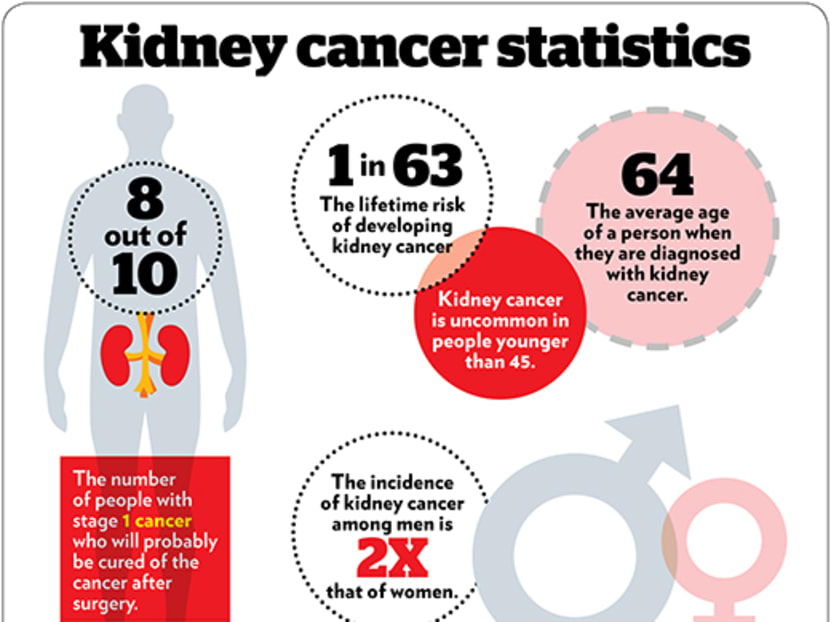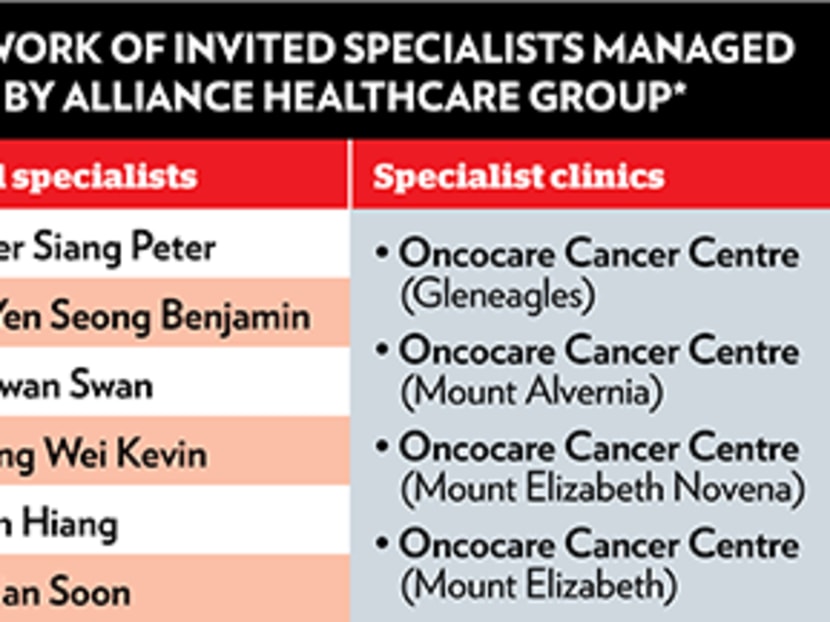Facing up to cancer
While the statistics may make for grim reading, cancer is not a death sentence – one of the keys to successful treatment is time. Dr Tay Miah Hiang, consultant medical oncologist at OncoCare Cancer Centre, said that the earlier a cancer is detected, the better the chances of it being cured.

Cancer is one of the principal causes of death in Singapore. Ministry of Health statistics show, for instance, that in 2015, 29.7 per cent of deaths in Singapore were due to cancer.
Among Singapore men, kidney cancer is one of the most common types of cancer. According to the Singapore Cancer Registry Annual Registry Report, Trends in Cancer Incidence in Singapore 2010 – 2014, kidney and other urinary cancers ranked 9th among the 10 most frequent cancers in males from 2010 to 2014.
TIME AND HOPE
While the statistics may make for grim reading, cancer is not a death sentence – one of the keys to successful treatment is time.
For instance, Dr Tay Miah Hiang, consultant medical oncologist at OncoCare Cancer Centre, said that if a patient is well enough to undergo treatment, eight out of 10 stage one cancer patients will probably be cured after surgery. The five-year survival rates for patients with stage two and three kidney cancer are 74 per cent and 53 per cent respectively.
Dr Tay said that the earlier a cancer is detected, the better the chances of it being cured. “Time is an important factor when it comes to determining whether a treatment can or cannot cure the cancer. Do not hesitate to seek further medical investigation and treatment when you suspect you may have cancer,” he said.
"Stage four cancer, which is defined as a cancer that has spread beyond the kidney or when the cancer has recurred, is unlikely to be curable. The five-year survival rates for such patients depend on other risk factors. These factors determine whether these patients are grouped according to a good prognosis, intermediate prognosis or poor prognosis," he added.
While no one can say for sure what definitively causes kidney cancer, certain factors can increase your risk of developing this disease. According to Dr Tay, these can be divided into fixed risks, such as family history, age and gender; and lifestyle factors like smoking, obesity and high blood pressure.
While you will not be able to change the fixed factors, you do have the power to make lifestyle changes such as quitting smoking and exercising more regularly.
EARLY SIGNS
It is important to note that some of the early symptoms of kidney cancer – including passing of blood in the urine, pain or pressure in the back or flank and unexplained fever – could also be attributed to other illnesses. Other possible symptoms of kidney cancer include fatigue (probably stemming from anaemia), unexplained weight loss and a rapid development of a cluster of enlarged veins, known as a varicocele, around a testicle.
While these symptoms do not definitively point to kidney cancer, it would be a good idea to seek specialised help, said Dr Tay. “Anyone who has such symptoms, especially if they persist after consulting your family doctor, should consult a urologist for a more thorough assessment This usually includes a urine test, an ultrasound and a CT scan to look for any abnormal mass in the kidney,” he said.
TREATMENT OPTIONS
What are the options if you or a loved one is diagnosed with kidney cancer? If it is diagnosed before it reaches stage 4 and you are fit enough, surgery is recommended, said Dr Tay.
“Depending on the size and the location of the tumour in the kidney, surgery will remove either the entire kidney or part of it, including the tumorous mass. After surgery, there is no other proven treatment to reduce the risk of recurrence,” he cautioned.
What happens though, if the kidney cancer is at a more advanced stage?
TARGETED THERAPY
Many people associate cancer treatment with chemotherapy. Chemotherapy usually describes a method of cancer treatment where drugs enter the bloodstream and circulate throughout the body to kill cancer cells that surgery or radiation cannot reach.
In the case of kidney cancer however, treatment options such as radiotherapy and chemotherapy are "usually not effective and are not often utilised”, according to Dr Tay.
Patients who are either diagnosed with stage 4 cancer or undergo a recurrence are usually referred to medical oncologists who use targeted therapy. This is a relatively new form of treatment that uses drugs or other substances to attack cancer cells and usually causes little damage to normal cells.
Other forms of treatment include immunotherapy, which aims to harness the body’s immune system to recognise and destroy cancer cells. It was previously used to treat stage four kidney cancer before the emergence of targeted therapy. A newer form of immunotherapy can be administered via a 30-minute to 1-hour infusion into the blood stream once every two weeks or three weeks.
Dr Tay says that the side effects are milder than before and do not occur frequently. The side effects are usually due to a high immune response and can take the form of diarrhoea or an allergic skin rash.
Said Dr Tay: “There has been a lot of improvement in the field of cancer treatment that is more effective and less destructive to normal cells, which has led to better survival rates compared to 10 years ago."
FASTER APPOINTMENTS FOR AVIVA MYSHIELD CUSTOMERS
As part of a collaboration between Aviva and Alliance Healthcare, Aviva MyShield customers can enjoy expedited appointments – within three working days – with over 200 medical specialists. Nine out of 10 specialists in this network have at least 12 years of medical experience.
Here is a list of medical oncologists within the network that you may contact if you or a loved one would like to explore a wider choice of cancer treatments.

*The specialist listing is accurate as at Aug 16, 2016. To view the full list of all specialists or make an appointment, go to www.aviva.com.sg/health-first.
Produced by the TODAY Special Projects Team
Aviva Ltd is not an agent, partner or in a joint-venture relationship with Alliance Healthcare Group. Alliance Healthcare ("AH") which expression shall include its Selection Committee and its related corporations) is not an agent of any of the above medical specialists nor are any of the medical specialists an agent of AH. Aviva Ltd or AH makes no representation or warranty whatsoever to the quality of the healthcare or services provided, and assumes no liability or responsibility for the acts, omissions or defaults of the clinics, specialist or any person providing the services. Claims eligibility is subject to the terms and conditions of the policy.








